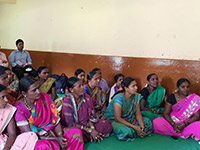
In a project supported by a Bangalore-based corporate, BPF trained women in rural Dharwad, to start their own enterprises by using its award-winning livelihood innovation Market-Oriented Value Enhancement (MOVE).
Around 62 women were mobilized for the training in MOVE, of which 32 participants successfully completed the training and 11 businesses have successfully been started. An evaluation of 50 MOVE entrepreneurs and their businesses showed a doubling of income of MOVE entrepreneurs from December 2015 to August 2017.
In a CSR funded project by Inflow Technologies, BPF documented and published a compendium of success stories titled ‘Stories of Triumph’ of those who had been trained in MOVE, Dharwad, India
In-depth interviews with MOVE participants in Dharwad were conducted between November 2015 and Jan 2016. This resulted in the production of a book of caselets titled ‘Stories of Triumph’. This book has twenty success stories and will be shared with funders, partners, etc. to showcase our work.
An external evaluation of 50 MOVE entrepreneurs and their businesses was conducted by a USAID Fellow in December 2015.
Anomalies in the data indicated the need to correct it before analysing and writing up the report. However, this project was put on hold due to other proposals and external project deadlines. An intern from the University of California, Berkeley will be working on the correction, analysis and finalization of the report and worked closely with the BPF Dharwad team.
Supporting trans people to find employment in the formal sector
Trans people face many challenges in finding appropriate jobs in the formal sector. Therefore, this is aimed at working with the community members and to place them in corporate. This grant helped us train members of the community in basic communication and other skills.
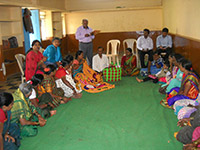
SELCO invited BPF to conduct a needs assessment for its micro-entrepreneurs who had adopted solar solutions for their businesses.
The SELCO Foundation links the benefits of sustainable energy to poverty eradication. BPF teams from Bangalore and Dharwad, engaged in data collection from Dharwad and studied and analysed this data. The final report with feedback incorporated was presented to Selco in September 2016, which made a number of recommendations for a comprehensive and inclusive approach to make a significant difference to the livelihoods of solar micro-entrepreneurs.
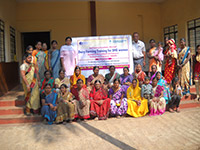
BPF was commissioned by NABARD under their Micro Credit Innovations Department to train 100 rural self-help-group women on setting up micro enterprises through BPF’s livelihood innovation - MOVE, in two villages in Dharwad district.
Four batches of training covering modules on motivation, customer orientation, business concepts, and market research were conducted in both villages. Concepts are communicated through interactive sessions, games, symbols, analysis and experiential training. The Participatory Market Analysis (PMA) forms a core module – participants are encouraged to select a business venture on the basis of market demand and competition, and only then price, promote and add value. A total of 53 trainees completed the Participatory Market Appraisal (PMA) and chose various ventures. Altogether, 21 businesses in Amminabhavi and 23 businesses in Garag were established. The CEO ZP Dharwad and DDM NABARD Dharwad visited some of the 35 businesses in February 2016, and were impressed with the quality of training and businesses started by the women.
Training sessions on women and gender issues were conducted in order to sensitise organizations to consider providing jobs to the transgender community members and thereby helping them join the mainstream.
The transgender community has very few employment opportunities and this is a major need. Corporate organisations in Karnataka have been helped to look at issues of diversity and inclusion. Sensitivity to the issue of transgenders has increased tremendously in the 15 organisations who participated. Three trans-people have been placed in jobs.

The focus of the research is to examine the gender gaps within the food supply chain and the factors that influence them including ground realities and challenges faced by women and vulnerable populations, including the elderly, people with disability and children, in the supply chain and markets, and make recommendations accordingly.
A stakeholder analysis would be designed to assess partner capacities to implement the proposed measures. Government and project resources and programmes would be analysed to this end. Rights and entitlements of vulnerable groups especially women, would constitute the backdrop against which the findings are analysed. Recommendations for future implementation and monitoring would be proposed, so that the venture can contribute successfully to greater equality and reduced risk through a gender-sensitive approach. Gender equality in terms of the food supply chain would be examined in a multi-stakeholder context with regard to Participation/ involvement in all aspects of the food supply chain; Decision making in different aspects of the food supply chain; and Operations of the components of this chain. The access of women and men, of differently abled and other vulnerable populations, and the factors that influence social inclusion was analysed.
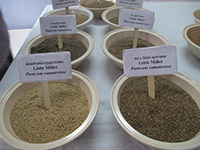
The M. S. Swaminathan Research Foundation (MSSRF) commissioned Best Practices Foundation (BPF) to take on a project to enable small millet producers to enhance their livelihoods through better market understanding. The study took place in five sites in Tamil Nadu – Salem, Namakkal, Coimbatore, Erode, and Kolli Hills.
Promoting small millet’s demands primarily requires that farmers themselves are made aware of the financial and environmental benefits of cultivating small millet. BPF recommends acquiring organic certifications as well as forming linkages with technical support institutions. Kolli Hills producers must establish quality control mechanisms, and they should build consumer trust by stating ingredients, lack of preservatives, and processing methods on the packaging. BPF encourages training local people from Kolli Hill to perform the role of distributors, doubling or even tripling the existing number of retail outlets in the process. BPF has proposed their MOVE livelihood model to make this happen. To form their marketing strategy, Kolli Hills producers need to research the different customer segments and develop their promotional material based on it. An onlinse shopping portal would be useful in building brand identity. This can also be done by dispelling myths about millets and disseminating information and benefits of millets in schools.
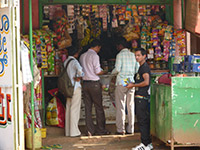
The Karnataka Health Promotion Trust asked BPF to help female sex workers, transgenders and men who have sex with men achieve a sustainable income and live a life of dignity.
Rejection, depression and desperation are something that stigmatized and ostracized sexual minority groups have to battle with on a daily basis. Living a life of dignity often remains a distant dream given the limitations society places on them. BPF’s award-winning livelihood innovation Market Oriented Value Enhancement (MOVE) was tailored to the specific needs of sexual minorities. The training programme was targeted at individuals between the ages of 18-50, who were running a small enterprise, eligible for financial support and were not involved with other training activities. The changes brought about included increases in monthly income, expenditure, personal assets and savings as compared to the baseline level as well as progress in stated personal aspirations. Another output was the MOVE manual to promote livelihoods for sexual minorities which is a practical guide to assist and replicate the MOVE process and will serve as an essential tool for future up-scaling of MOVE with these populations. One outcome of this innovation was to ensure future replicability by developing a manual for MOVE training that is tailored to the specific needs of MSM-T participants. BPF is happy to launch this unique manual and initiative that will serve as an essential tool for future up-scaling of MOVE with these populations.
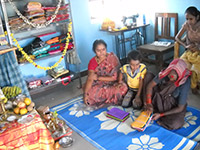
The Project aimed at training 120 participants from six villages in Dharwad taluk and about 60 businesses are expected to start by the end of the project. To date 160 people have completed the training and about 25 have already started the businesses. Another 35 businesses are expected to start in the next six months.
The project aimed at Knowledge Capacity Transfer to SSP trainers/women, towards which BPF conducted 14 days training on MOVE to develop course curriculum with the participation of existing entrepreneurs and staff in SSP’s working areas in Maharashtra.
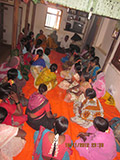
The 5-month project which began in November 2012 trained 34 participants in MOVE by BPF staff, 29 of these participants completed the training. By the end of the project 18 of the participants either went on to start their own business or scale up existing ones.
Thirty-four participants underwent MOVE trianing; 12 from Timmapur, 12 from Jekkinakatti, 5 from Mantrodi and 5 members of UAS staff. The training was conducted by BPF in partnership with the Department of Food Sciences and Nutrition, UAS, Dharwad. Twenty-nine participants completed the programme of which 18 went on to start their own businesses or scale up existing businesses. Ten of these businesses pertain to small millet products. Average incomes of entrepreneurs selling small millet products alone more than doubled from 850 INR to 2,113 INR. The other eight have added millet-based products as a second business. The new entrepreneurs were exposed to markets in Shiggaon and Hubli to enable them to expand their markets for millet products. All the participants have increased their income by up to 249%. The minimum income earned after MOVE was Rs 700 by Roopa Alagwadi; the maximum, Rs 5,700 by Shakuntala Kundagol.
MOVE Impact Small Millet Producers 1

Supported by the Sir Dorabji Tata Trust
BPF's pioneering model for livelihoods - MOVE - tailored for Commodities and Services
For the International Transport Workers' Federation
The Tariff Authority for Major Ports (TAMP) regulates the entry of private companies into the port sector in India. Their orders as of 28 February 2012, lowered tariffs, threatening the very survival of the industry. The International Transport Workers' Federation (ITF), a global federation of unions, has been working with its affiliates in India to address labour issues in the port sector. It engaged BPF to conduct strategic communications with companies and unions to assess the types of interventions that could help port workers in this environment.
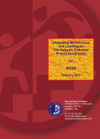
For HIVOS
Swayam Shikshan Prayog (SSP) is a learning and development organisation active in rural Maharashtra and other states. This project comprehensively documents its initiatives, lessons and insights, with a view to facilitating women's access to microfinance, livelihoods, health and other services.
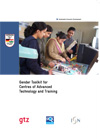
For GTZ, an Indo-German bilateral technical cooperation initiative
Women currently constitute just nine per cent of students enrolled in India's industrial training institutes. To stay globally competitive with countries that are emphasising skilling across the board, and to give women access to better paid jobs, industries must build a large, technologically skilled workforce responsive to market needs. Since women constitute half the workforce, upgrading their skills is of the foremost importance.
In 2007-08, BPF undertook a study whose primary objective was to develop a gender strategy that would expand technical opportunities for women and promote their participation in vocational training in non-traditional, male dominated technical and vocational education and training institutes (TVETs).
Commissioned by GTZ, an Indo-German bilateral technical cooperation initiative, we researched technical training institutes across five states in India. Our findings shaped a five-module gender toolkit centred on gender planning, budgeting, sensitisation, implementation of gender plans, and monitoring. They revealed that open access alone does not boost the enrollment of women in TVETs. What is required is a deliberate gender strategy that entails active recruitment, adaption to the needs of women and dialogue on gender mainstreaming.
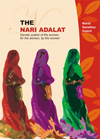
Commissioned by Department of Panchayats and Rural Development, Government of West Bengal
A participatory rapid appraisal with multiple stakeholders to assess the potential for applying the MOVE methodology to enable members of federations and SHGs to assess markets and create sustainable livelihoods.
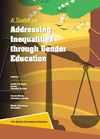
Commissioned by CARE, India
A feasibility study to determine if MOVE could be applied to promote sustainable livelihoods in tsunami-hit villages of Tamil Nadu. The study involved a participatory rapid appraisal with multiple stakeholders in six villages with almost 3,000 households.
In partnership with CARE, Delhi
The Credit and Savings for Household Enterprise (CASHE) programme supports the development of community-based and owned micro-finance organisations and enables their access to capacity building services. This study assesses its impact across three states vis-a-vis control groups, its log frame indicators and overall goals.
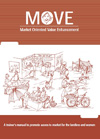
BPF gender/ livelihood innovation
Turning the poor into entrepreneurs can radically transform their standard of living and social status. BPF's Market Oriented Value Enhancement (MOVE) methodology teaches participants to understand and enter the market through an innovative tool called a Participatory Market Appraisal.
GRET, France
An evaluation of micro-finance initiatives for housing through Namma Mane in four sites in Karnataka.
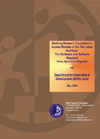
Urban Agriculture magazine, May 2004
Livelihood initiatives often overlook the needs of landless women, who tend to be less mobile and encumbered by reproductive responsibilities. This article makes a strong case for addressing the issue by a) building their capacity to understand markets b) mobilising them into groups c) creating innovative financial instruments, and d) providing a marketing infrastructure.
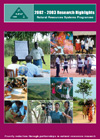
Natural Resources Systems Programme newsletter, 2002-03
Although peri-urban markets offer significant livelihood opportunities, the poorest women find it exceedingly difficult to succeed. Strategies developed by governments and NGOs to address the issue usually take into account only those with either some land or assets. It was in response to this that BPF, working in the peri-urban interface of Hubli-Dharwad, created an innovation called MOVE . This article identifies key factors that enable the poorest, illiterate women in peri-urban areas to create sustainable livelihoods for themselves.
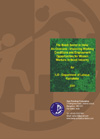
For ILO and the Department of Labour, Government of Karnataka
A comprehensive overview of India's beedi industry and the goals and expected outcomes of ILO's beedi sector programme. The report recommends a two pronged strategy of working with the community that includes a) mobilising female relatives of beedi workers into SHGs for alternative livelihoods, and (b) working with unions to improve the conditions of beedi workers.
For the Department of Women and Child Development, Government of Karnataka
This study reviews self-help group programmes and concepts, identifies gaps and offers recommendations for information and field initiatives in Karnataka. The overall policy to facilitate women's access to and control over resources, was written from the perspectives of three institutional actors in the field - government, banks and the NGO sector.
For South Asian Research and Development Initiative
The study examines the working conditions of women in industry looking at wages, timings, promotions, benefits, facilities, occupational health and safety, collective bargaining and harassment at the workplace. It also tries to surface any best practices to advocate change and make collective bargaining gender sensitive